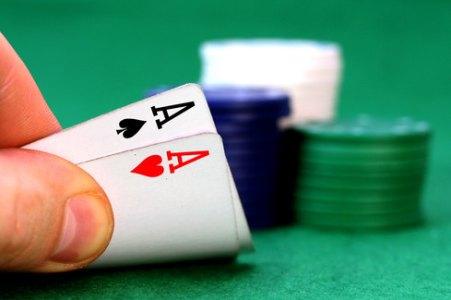
Texas poker players hope to see more legal poker games and higher chip stacks in their state with the help of the Poker Gaming Act of 2013. (Courtesy of playpartypoker.org)
Hayden Sneed travels more than 120 miles round trip from Plano to play the game he loves. Sneed, 23, said it is a hassle to make the trek across the Red River just for a game of poker. But there may be some good news on the horizon for poker lovers like Sneed.
With the help of State Representative Eddie Rodriguez and the Poker Gaming Act of 2013, poker players in Texas might finally find Texas Hold ‘Em and other forms of poker legal inside Texas borders. If the legislation passes before the end of regular session on May 27, poker would be legal to play online, in bingo halls or inside of special clubs.
“It would be ultimately convenient because I’m already expending gas and time for a game,” Sneed said. “Over half of the parking lot [at Winstar Casino] in Oklahoma is full of Texas license plates.”
The poker gaming act and online poker acts of 2013 would legalize and regulate poker within certain areas of Texas, while also boosting Texas’ economy by providing upwards of $10 million dollars in extra revenue, according to Nate Walker, Rodriguez’s chief of staff. “It could regulate the illegal poker games played here,” Walker said. “This could make it legally acceptable.”
Sneed said that he wouldn’t mind playing in bingo halls around Dallas, even though there would probably be fewer players at the table than in the much larger poker rooms in the casinos in Oklahoma. He said he would still be more apt to attend a game a few miles away versus the 60 it takes to get to a legal table now.
“Even at a $60 buy-in, it’s still much more appealing,” Sneed said. “Around here, I think there’s no way it couldn’t be popular.”
Currently in Texas, games at personal residences are legal, but only if the winnings are distributed among the players, and the house does not take a cut.
This bill would help to regulate illegal games now being played throughout the state, including in homes and warehouses that illegally take a cut. Instead, games would be played in establishments that would be regulated and taxed by the state.
“In Dallas there are warehouses where you need to know a secret knock or password just to get in,” Walker said. “We’ve seen articles in newspapers about robberies and gunfights at these types of meetings.”
Rob Kohler, representative of the Christian Life Commission of the Baptist General Convention of Texas, is against the legislation. He does not believe Texas should rely on legal gambling to increase its tax revenues.
“The most important thing that people on both sides of the argument agree on is that someone is going to get hurt,” Kohler said. “It’s just a matter of how many that’s disputed.”
While most players argue that poker is a game of skill rather than a game of luck like the lottery, that is not enough to convert the game’s detractors.
“You enable a lot of impulse buyers, which we’ve identified as scratch off and lottery ticket buyers,” Kohler said.
Poker, specifically Texas Hold ’em, has seen a large growth in popularity over the last decade due to the rising surge of the World Series of Poker’s tournaments in Las Vegas. In 2002, the main event barely attracted 600 players, but it has averaged well over 6,000 in each of the last seven years.
Along with the annual event’s broadcasts on ESPN, dozens of books and films have turned the simple card game into a billion-dollar industry. Online poker sites such as pokerstars.net and ultimatebet.com have become household names in the card player’s community.
In an interview with Bloomberg news, Steve Wynn, owner of Wynn Resorts, which operates some of the country’s largest casinos, commented on the potential regulation of online poker.
“Internet poker seems to be screaming for regulation,” Wynn said. “States can get money at a time when they need money. It seems like an intelligent thing to sit down and regulate it.”
Recent events have hurt the online poker world, including a case in April of 2011 involving the U.S. Attorney’s office in New York accusing pokerstars.com of fraud and laundering money, which resulted in online poker games played for money being outlawed in the U.S.
With passage of the state’s Poker Gaming Act, Texas residents would be free once again to set up accounts and play for real money on online sites again.








